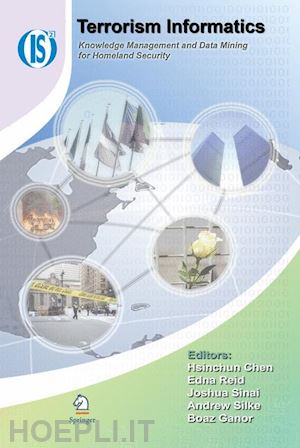

Questo prodotto usufruisce delle SPEDIZIONI GRATIS
selezionando l'opzione Corriere Veloce in fase di ordine.
Pagabile anche con Carta della cultura giovani e del merito, 18App Bonus Cultura e Carta del Docente
Terrorism informatics has been defined as the application of advanced methodologies, information fusion and analysis techniques to acquire, integrate process, analyze, and manage the diversity of terrorism-related information for international and homeland security-related applications. The variety of methods used in terrorism informatics are derived from Computer Science, Informatics, Statistics, Mathematics, Linguistics, Social Sciences, and Public Policy and they involve the collection of a mass of information from multiple sources and in numerous languages.
TERRORISM INFORMATICS: Knowledge Management and Data Mining for Homeland Security will provide an interdisciplinary and comprehensive survey of the state-of-the-art of terrorism informatics domain along three basic dimensions: methodological issues in terrorism research; information infusion techniques to support terrorism prevention, detection, and response; and legal, social, privacy, and data confidentiality challenges and approaches.











Il sito utilizza cookie ed altri strumenti di tracciamento che raccolgono informazioni dal dispositivo dell’utente. Oltre ai cookie tecnici ed analitici aggregati, strettamente necessari per il funzionamento di questo sito web, previo consenso dell’utente possono essere installati cookie di profilazione e marketing e cookie dei social media. Cliccando su “Accetto tutti i cookie” saranno attivate tutte le categorie di cookie. Per accettare solo deterninate categorie di cookie, cliccare invece su “Impostazioni cookie”. Chiudendo il banner o continuando a navigare saranno installati solo cookie tecnici. Per maggiori dettagli, consultare la Cookie Policy.